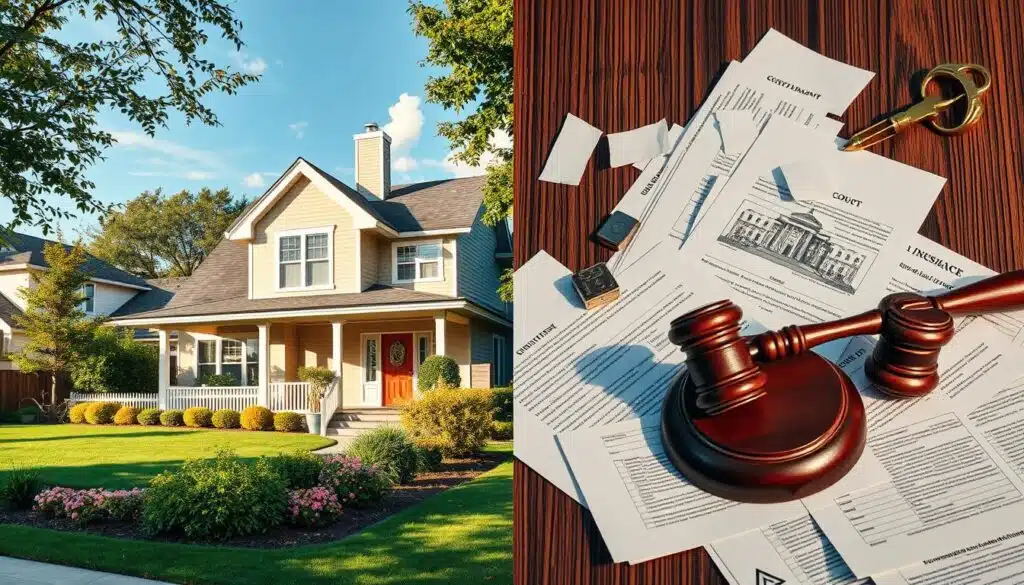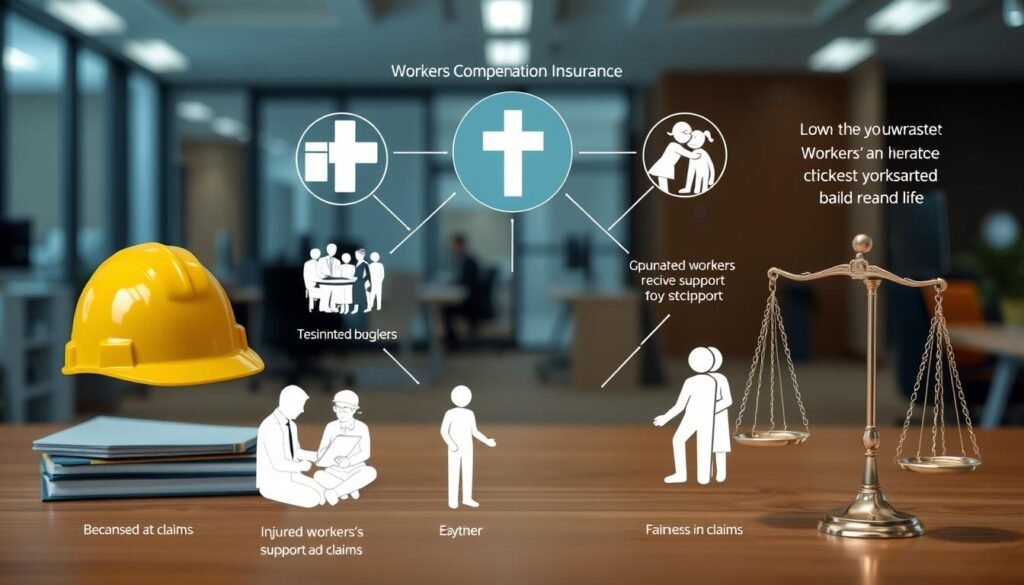Many homeowners struggle with suing their home insurance company. This is often due to claim disputes in a world with more denials and complex systems. It can lead to financial stress and emotional pain, making people feel helpless.
It’s important to know how to navigate the process of civil dispute suing home insurance process. Taking legal action against insurance companies needs the right guidance. Knowing what to expect can help you succeed in resolving insurance disputes.
Table of Contents
ToggleKey Points
- Understand your rights as a homeowner under your policy.
- Document all communications with your insurance company thoroughly.
- Consult with a legal expert to assess the viability of your case.
- Be prepared for possible delays in the legal process.
- Consider mediation as a first step before going to court.
- Know the timelines set by state rules for filing claims and lawsuits.
Overview of Homeowners Insurance
Homeowners insurance is a must-have for property owners. It protects against damage from natural disasters, theft, and vandalism. The main parts of homeowners insurance basics are dwelling coverage, personal property protection, and liability coverage. Knowing these parts well can help a lot when making claims.
Personal liability coverage usually ranges from $100,000 to $500,000. Medical payments coverage is between $1,000 and $5,000 for minor injuries.
It’s good to know the insurance policy details to be ready for claims. The average cost of a claim is $15,000 to $20,000. About 1 in 6 homeowners might face a liability claim, so understanding how claims are handled is key.
Trips and falls are common, making up 29% of liability claims. Knowing this can help you prepare better.
It’s important to know that many policies don’t cover home-based business liabilities, about 80%. Intentional acts are also not covered, which can lead to claim denials. Understanding these points helps homeowners protect their property better. This way, they can face insurance challenges more confidently.
Common Reasons for Insurance Claims Denial
Knowing why insurance claims get denied is key for homeowners. About 5-10% of claims are turned down each year. This shows how important it is to know what can go wrong in the claims process. Here are some common reasons:
- Incomplete or Inaccurate Information: Half of denied claims come from bad or missing info. This info is often given by the policyholder.
- Policy Exclusions: Around 15% of claims are denied because they’re not covered. This includes things like flooding or earthquakes, which are often not included.
- Late Filing: About 10% of claims are denied because they’re filed too late. Deadlines are usually between 180 days and one year.
- Failure to Make Temporary Repairs: If temporary fixes aren’t done, 15% of claims might be denied.
- Incomplete Claims Documentation: Not having enough proof can lead to 25% of claims being denied.
- Policy Lapse: 5-10% of claims are denied because the policy wasn’t paid for.
- Normal Wear and Tear: About 40% of claims for older homes are denied because they’re just wear and tear.
- Negligence: If the policyholder was careless, 20% of claims might be denied.
- Fraud Suspicion: Claims can be denied if there’s a hint of fraud, affecting 2-5% of cases.
These reasons can affect the homeowners insurance lawsuit process. Knowing this helps people prepare their claims better. It can also lower the chance of disputes over property damage lawsuit insurance. Understanding the claims process and why claims get denied helps homeowners fight for their rights and take legal action if needed.
The Importance of Documenting Your Claim
Keeping detailed records is key when filing a claim for homeowners. Accurate documentation helps show the damage to your insurer. It’s important to organize and keep records up to date, as they help in disputes over damage claims.
Homeowners should take photos, save receipts, and make a list of their belongings. This helps prove the extent of the damage.
Keeping your documents in order is important for smooth talks with your insurance company. It’s also good to keep a record of all conversations. This makes your claim look stronger and can help in legal cases if needed.
Having an updated list of your belongings and any damage is very helpful. It shows the current state of your property and any damage.
If your claim is questioned, having detailed records is very important. This careful record-keeping helps you defend your claim. Being proactive in documenting your insurance claims is very useful, even if you face legal issues with a claim denial or underpayment.
Steps to Take Before Suing Your Home Insurance Company

Before taking legal action against an insurance company, it’s important to prepare well. Start by using all appeal processes your insurer offers. This can often solve disputes without going to court. About 30% of denied claims are overturned on appeal, showing its value.
Collecting solid evidence is key to a strong case. Keep records of all talks, claims, and denials from your insurer. Around 60% of denied claims are due to missing documents. Knowing your policy’s terms and what’s excluded is also vital to avoid legal battles. Sadly, about 20% of claims are denied at first.
Talking to a lawyer who knows insurance law can really help. Studies show those with lawyers are 70% more likely to win than those without. Also, try mediation to settle disputes. Over 90% of lawsuits settle before trial, showing mediation’s power.
Knowing the costs of suing is also key. Legal fees can be high, from $150 to $500 an hour. Total costs can be over $10,000 for complex cases. Think carefully about whether to sue or try to settle things amicably.
| Step | Description | Potential Outcome |
|---|---|---|
| Exhaust Internal Appeals | Use all procedures given by the insurance company before legal action. | 30% of denied claims may be overturned. |
| Gather Evidence | Collect all documents, like claim submissions and communications. | Reduces denial chances; key for strong cases. |
| Consult Attorney | Get advice from a legal expert in insurance disputes. | Increases winning chances by 70%. |
| Explore Mediation | Consider mediation instead of litigation. | Over 90% of lawsuits settle without trial. |
| Understand Costs | Know the possible legal fees and total costs of suing. | Legal costs can be over $10,000. |
The Process of Civil Dispute Suing Home Insurance
Suing an insurance company is a complex journey, often involving homeowners insurance lawsuits. Many homeowners face challenges when they have a residential insurance policy dispute. They wonder if they should take legal action. Knowing the steps in such a civil dispute helps in better preparation and decision-making.
Initial Consultation with an Attorney
The first step is an initial consultation with an attorney. It’s important to choose a lawyer who specializes in insurance disputes. A good attorney will look at your situation and talk about suing the insurance company for bad faith. They will explain what to expect and the steps to take.
Gathering Evidence and Documentation
After talking to an attorney, you need to gather evidence and documents. Collect all important documents, like your insurance policy and any evidence that supports your claim. This preparation is key to a strong case. Remember, the discovery process can take months to over a year, so be thorough.
Filing the Lawsuit
Filing the lawsuit is a big step. If you’re seeking more than $20,000, you must file in civil court. Claims of $20,000 or less can be filed in the special civil part. Filing costs $250 in New Jersey. If defendants don’t respond within 35 days, they could face a default judgment. It’s important to understand the legal procedures and costs.
Discovering and Investigating the Case
The discovery process is key in insurance lawsuits. It lets both sides share important information. This step can greatly affect how well a case settles or goes to trial.
The Role of Discovery in Insurance Litigation
The discovery phase is a step before trial. It makes sure both sides are open and fair. This is very important in civil disputes.
About 70% of civil cases settle before trial. Discovery is a big part of these talks. Using discovery tools well can really change how a case goes, with over 80% of lawyers agreeing.
During this time, written questions help clear up case details. There can be thousands of documents asked for, showing how much evidence is gathered. In personal injury cases, about 60% of the time, expert witnesses are asked for their opinions.
Understanding Depositions
Depositions are where people give sworn statements. These can take hours or days, depending on the case and witnesses. Requests for admissions can make things faster, possibly cutting trial time by up to 30%.
Discovery can cost a lot, up to 20% of all legal costs. This shows how important it is to use strategies wisely.
Good discovery processes can lead to better settlement chances. They help both sides understand their case better. In personal injury cases, about 65% of key evidence is found during discovery.
So, clients need to know their rights during discovery. They should also trust their lawyers to protect their interests against the other side’s legal team.
Mediation and Settlement Options
Mediation is a key part of insurance mediation services. It helps homeowners solve disputes with their insurers quickly. This method lets parties talk about settlements with a neutral person leading the way. It’s good because it’s voluntary, which means everyone can agree without being forced.
More than 90% of civil lawsuits settle before trial. This means less time and money spent on legal battles.
Using dispute resolution options like mediation can make legal fights easier. The mediation process keeps talks private, which helps build trust. This is important for reaching good agreements.
Mediators need the right training to do their job well. Many states also protect policyholders by limiting arbitration clauses in insurance contracts. Mediation is faster and cheaper than going to court, which can save money.
Knowing the good things about mediation is important for homeowners. Here’s a quick look at why mediation is good:
| Benefits of Mediation | Description |
|---|---|
| Cost-Efficiency | Typically lower fees compared to litigation |
| Time-Saving | Faster resolution processes |
| Confidentiality | Discussions remain private, fostering open communication |
| Control | Parties have a say in the outcomes, promoting satisfaction |
| Impartiality | Mediators are required to avoid any bias |
The Trial Process and What to Expect

Going through the trial process can feel overwhelming for homeowners in an insurance dispute. This part explains what you might see in court. Key parts include picking a jury, showing evidence, and hearing from witnesses. Knowing what happens in court is key for homeowners fighting for their rights.
Preparing for Trial as a Plaintiff
Getting ready for trial means working closely with your lawyer to build a strong case. You need to understand the different outcomes of insurance disputes. These can range from property damage claims to contract issues.
There are two main types of civil cases based on the money involved. Unlimited cases are over $35,000, and limited cases are $35,000 or less.
Having good legal help and detailed documents is essential. Legal mistakes can lead to big problems in complex cases. Also, about 70% of lawsuits settle before trial, so being well-prepared is key.
Collecting evidence is critical to support your claims. Getting 2-3 repair estimates is often advised, as they can greatly affect the trial’s result. In civil cases, you only need to prove your claim by a “preponderance of the evidence,” unlike criminal cases which require “beyond a reasonable doubt”.
Understanding the trial process and preparing for court can make things clearer. Working closely with your lawyer and being strategic can help homeowners in insurance disputes.
Potential Outcomes of a Civil Insurance Dispute
The results of insurance lawsuits can change a lot. This depends on the case details and the strategy used. About 60-70% of civil cases settle before trial. The success of these settlements often relies on the negotiation skills of both sides and the insurance company’s willingness to agree.
When cases do go to trial, 50-60% of plaintiffs win money. Trials can last from one to three years. The legal costs can be high, from $10,000 to over $50,000. It’s important for homeowners to know these costs before starting a lawsuit.
If a verdict goes against you, the appeals process can add six months to two years. About 20-30% of judgments are appealed. Homeowners should think about the emotional impact of litigation, as over 40% of people experience stress.
| Outcome Type | Description | Statistical Insight |
|---|---|---|
| Settlement | Resolution before trial | 60-70% success rate |
| Trial Verdict | Monetary award to plaintiffs | 50-60% of cases succeed |
| Appeals Process | Additional time after losing a case | 20-30% chance of a decision appeal |
| Resolution Duration | Timeframe of civil litigation | 1 to 3 years |
| Legal Costs | Expenses for pursuing litigation | $10,000 to $50,000 or more |
| Emotional Impact | Stress affecting participants | Over 40% experience stress |
Legal Options After Losing Your Case
Feeling overwhelmed after losing an insurance dispute is normal. Homeowners have several options to consider next. The appeals process in insurance litigation lets you challenge the court’s decision.
Looking into post-trial options insurance is key. A good lawyer can explain your chances of winning an appeal, the costs, and the time needed. Remember, appealing doesn’t guarantee a win but can give you a chance to present more evidence or arguments.
There are other ways to handle things too. You could try administrative hearings with state insurance regulators. Or, you might negotiate a fair settlement with your insurance company. This is a good option if the original policy terms were unclear.
Many people don’t think about moving from litigation to negotiation. Keeping in touch with your insurance company might lead to a better claim review. By staying involved, you can explore all avenues for fair treatment.
“Civil lawsuits often see approximately 90% of cases being settled before reaching trial; the remaining 10% are typically resolved through the trial process.”
“It is estimated that around 40% of households do not have an umbrella insurance policy, which could protect against civil suits beyond standard coverage limits.”
“Investment in umbrella liability insurance policies is recommended as a foundational step for asset protection against civil action.”
Conclusion
Insurance litigation can be complex, but knowing your homeowners insurance well helps. Keeping good records is also key. This summary of insurance litigation highlights important points for dealing with home insurance disputes.
It’s important to handle insurance claims carefully and patiently. This ensures your rights are looked after every step of the way.
Knowing the legal help you need is important, as it affects your case’s timing. Being well-prepared helps you face challenges like bad judgments and where to file your case. These are key parts of your strategy in a home insurance dispute.
Thinking about your next move? Getting professional legal advice is a good idea. It can help you understand your situation better and protect your rights. With the right advice, you can handle insurance litigation more effectively. Make sure to make informed decisions and stay active in your case.








